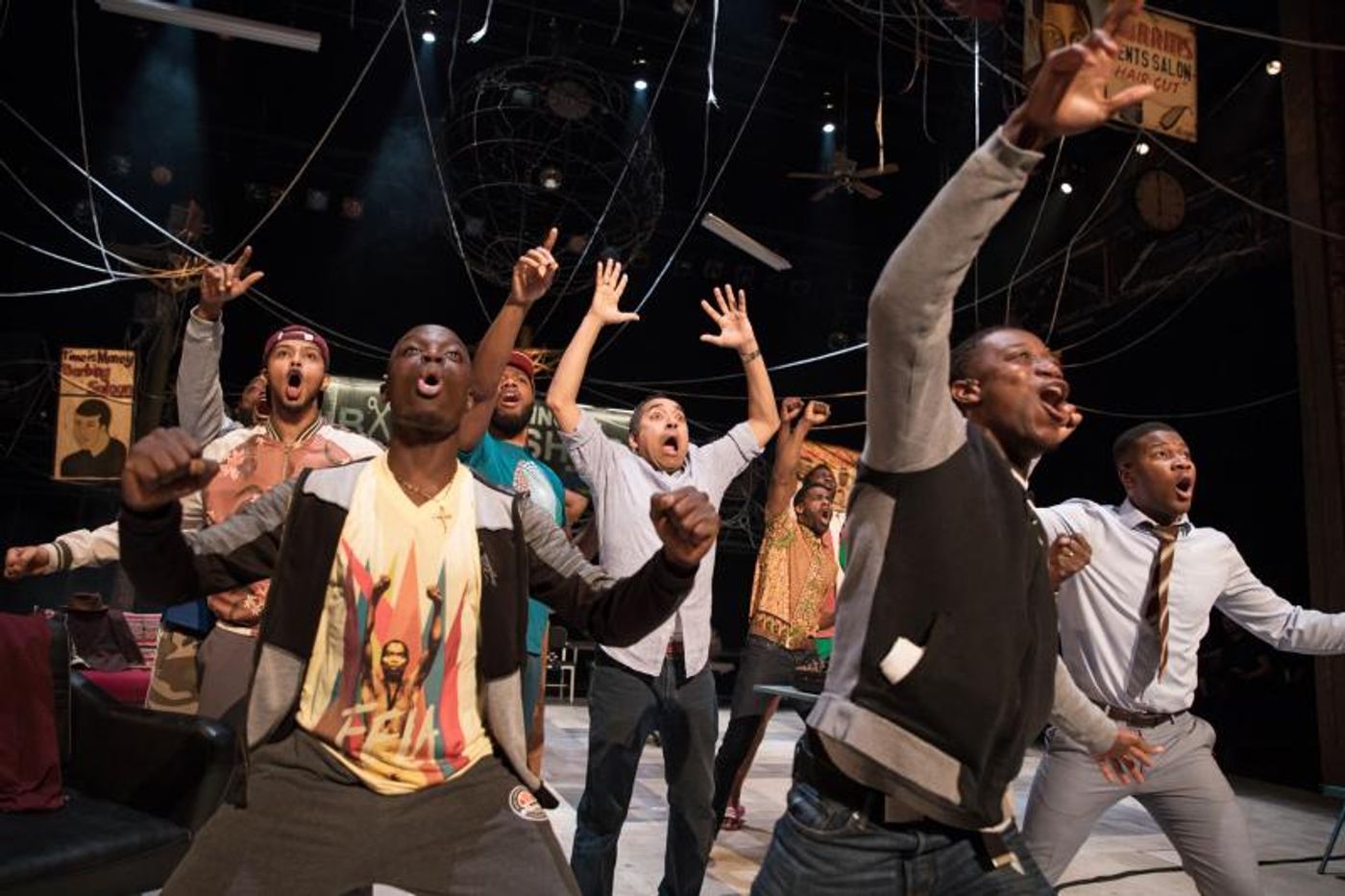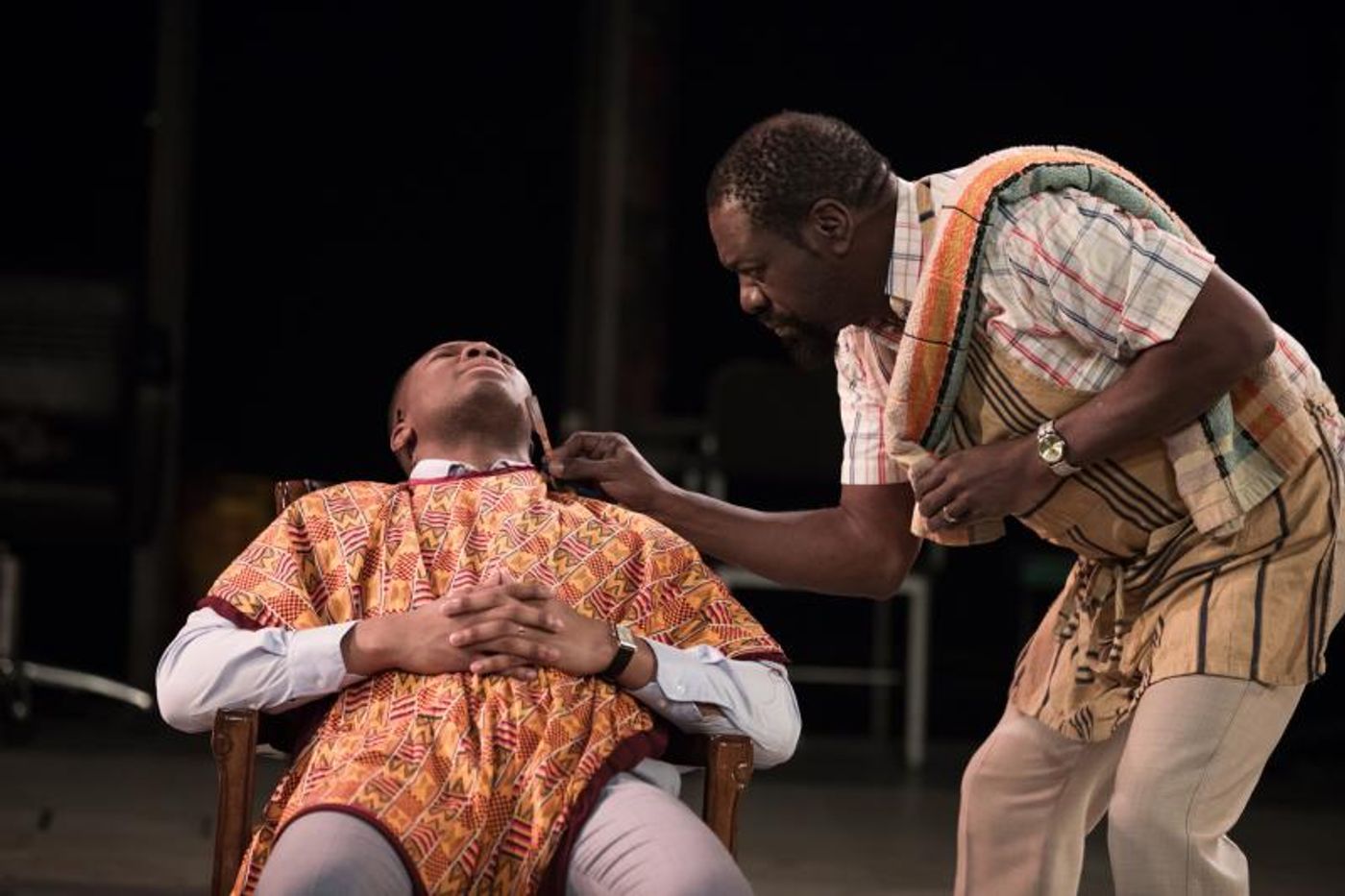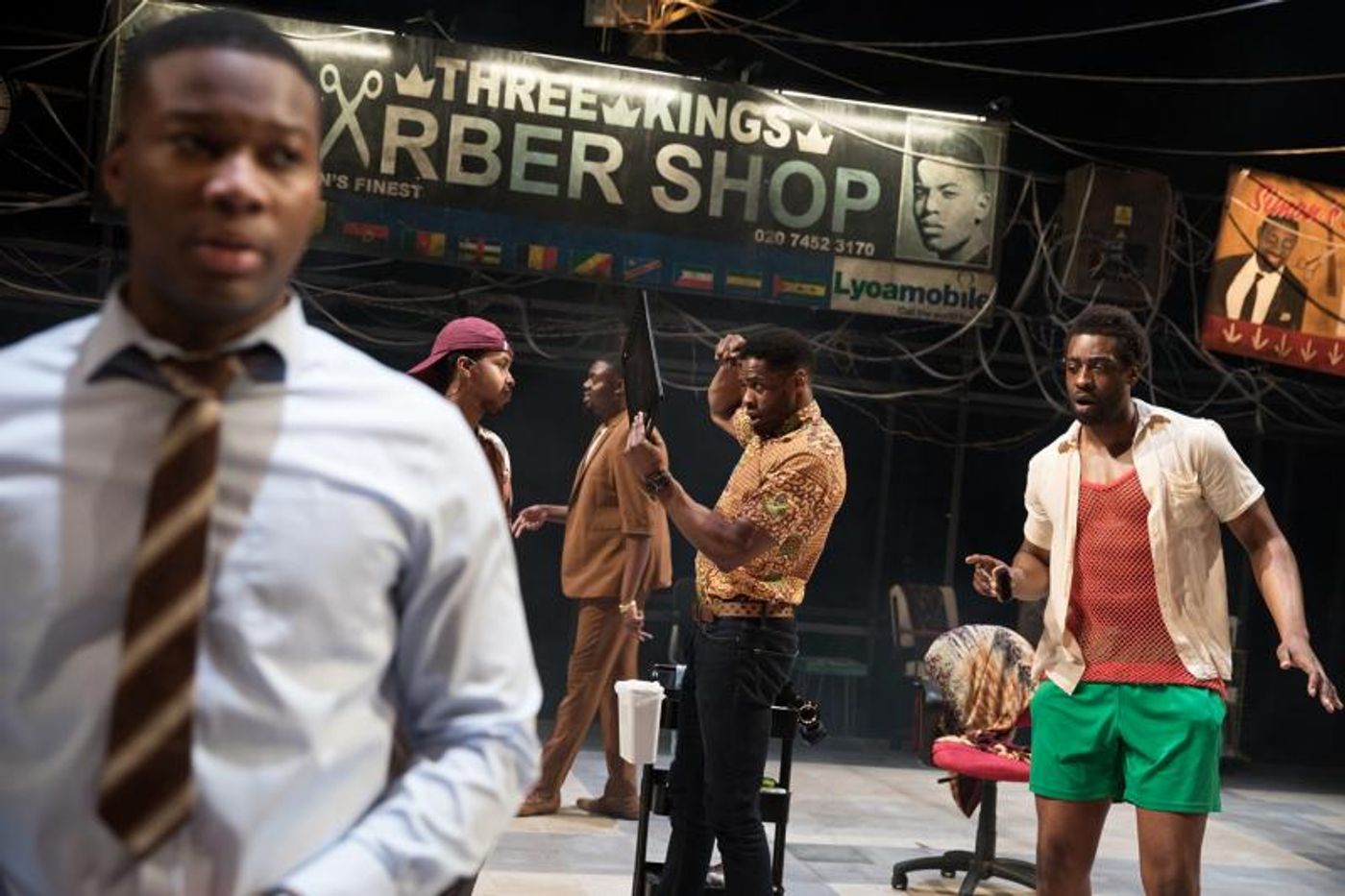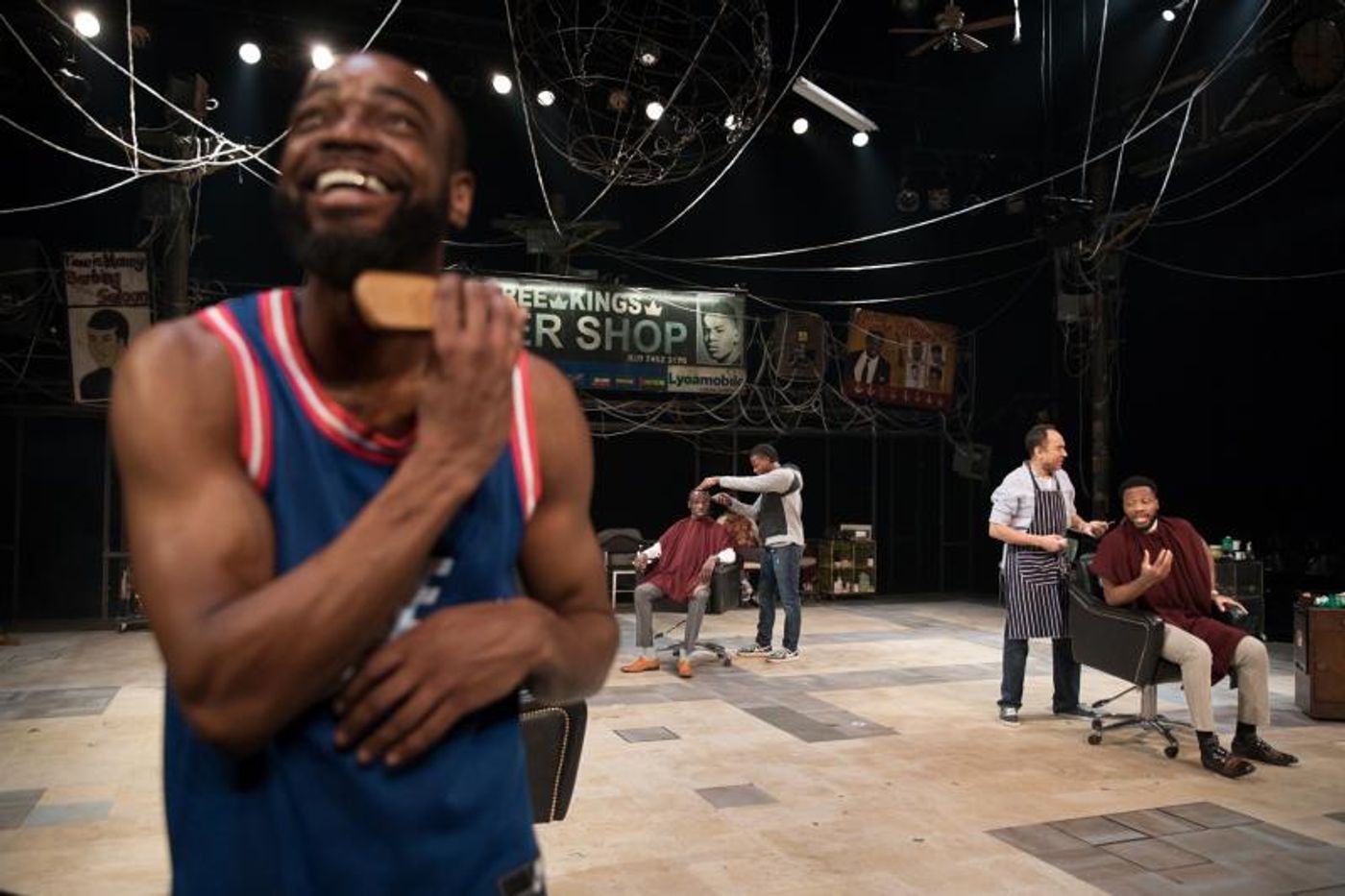Review: BARBER SHOP CHRONICLES Showcases Salons as a Beacon of Hope for Contemporary Black Men

While a salon in SoHo might evoke a certain sense of glamour, prestige and elite exclusivity, the barbershops visited in Queens, the Bronx, and especially Brooklyn - pretty much outside most of Manhattan (with Harlem, Washington Heights, the fringes of the East Village and other such pockets being notable exceptions) - fulfill a different kind of need that runs far deeper than vanity. They act as a kind of community center for men, particularly black men, which is why this rich and vibrant barber chair confessionals culture tends to spring up around the more ethnic neighborhoods. One would be hard-pressed to find such a communal hub in the Upper East Side, but then again - who knows? In Europe, revolutions started in cafes, in the African diaspora, revelations happen in barber shops.
Portrayals of the barbershop community and culture have been showcased and explored in entertainment before. There's the unforgettable, charming scenes from Coming To America where all of the lively characters (including a white Jewish man) in a Queens cut-and-shave were played by Eddie Murphy, Arsenio Hall, Clint Smith, and Cuba Gooding Jr., and the aptly titled Barbershop film franchise starring Ice Cube and Cedric the Entertainer which spawned two sequels, a female-driven spinoff and television series - just to name a few. But none have nailed the significance of this kind of place where conversations, occasional clashes and consistent camaraderie matter as much as a closely shorn chin or perfect fade more provocatively, powerfully or intimately than Nigerian poet and playwright Inua Ellams' Barber Shop Chronicles.

The U.K. import finally came to America as part of BAM's new Artistic Director David Binder's bold, first Next Wave season. After a surprising smash-hit sell-out success at The National Theatre in London and other dates touring Britain, the show set up shop at the BAM Harvey Theater for a limited run from December 3-8. But as commonplace as the setting felt to the Fort Greene neighborhood, the barbershops featured in Chronicles are not from the five boroughs but six cities across five different African nations - Johannesburg in South Africa, Kampala in Uganda, Lagos in Nigeria, Harare in Zimbabwe, Accra in Ghana - and London, England, where men from all of those countries and cultures meet. Over the course of a day revolving around a soccer match (Chelsea vs Barcelona) the vignettes offer a fly on the wall glimpse of African men, their commonalities, concerns and connecting forces. The expansive international reach of the show actually made it feel incredibly personal and astoundingly universal at the same time. The characters that frequent and flavor these tonsoriums could have come from anywhere, across the USA or Europe as much as Africa, rendering their stories and situations as familiar as one's own and immediately grounding the global show in common human themes, needs, desires and concerns, all rooted in the experience of the modern black man.
Nigerian-born Ellams came to the bustling international hub of London at age 12 but has not yet become an official U.K. citizen (and with tensions surrounding Brexit, things for immigrants are not looking hopeful). He also feels like an outsider of sorts in his native country after having been away for so long. The characters he created for Barber Shop Chronicles are also global citizens of sorts - stuck somewhere between two worlds - with varied relationships to their homelands, or what that term even means anymore. Africa as a concept becomes a character itself and what or who is considered truly African or is criticized for being influenced by the diaspora, the aftermath of colonialism and the western world is called into question but never fully answered because it cannot be. Through casual conversations over clippers and shears, they reveal the topics that tickle or trouble contemporary black men worldwide: education, relationships (with women, with other men and between fathers and their sons), sexuality, racism, violence, religion, language (including native and new tongues and loaded words) and history.
Ellams sat in many a barbershop himself to study and absorb the matters that would become the material for the play. He enforced the rule of three: anything mentioned thrice was going in the show.

But lest it may seem too dramatic and likely to drown in its own intensity of topics, the reason Barber Shop Chronicles hits home so hard is that the characters (and the phenomenal cast - Micah Balfour, Okorie Chukwu, Maynard Eziashi, Ade Dee Haastrup, Emmanuel Ighodaro, Demmy Ladipo, Mohammed Mansaray, Tom Moutchi, Anthony Ofoegbu, Elmi Rashid Elmi, Eric Shango and David Webber - the original U.K. company, all of African or Carribean origin) are so layered and likable, with stories so intrinsically intertwined that watching the slice of life scenes unfold like a soap opera or a page-turner novel. You become invested in their lives, longings and foibles as you would a neighbor or friend. There is also so much outrageous comedy and exuberance strewn throughout that the bottom of the ocean depth of the piece almost sneaks up on you - much like in life - as a revelation when connections are made and more dimensions unfurl.
The show begins with a raceous scene that gets the audience into the action where guests are invited to participate in an "existential haircut" as my barber, Anthony Ofoegbu (who plays the central character of Emmanuel - the patient, gentle and ubiquitous 'uncle' figure in the Three Kings Barbers in London) put it. (I told him "just a bit off the top" but got more than I bargained for. My hair may have remained intact but my mind was blown and heart opened by the end of the Barber Shop Chronicles experience).
Bijan Sheibani's superb direction makes certain the energy never stops during a trip around the world through hairdresser's establishments but allows for potent pauses to let the weight of the words and the men's musings sink in. The transitions between places are cleverly transformed into opportunities to rouse the audience's energy with pulsing Afrobeat music and dance breaks (some with the barbershop furniture, giving a whole new impression of a 'chair dance') masterfully and amusingly choreographed by Aline David. But it is Ellams' way with words, naturalism, simplicity, flow and ability to observe the human spirit within the walls of salons that holds a mirror up to this global culture, as well as the greater contemporary society these men find themselves in, and reveals the importance of places such as these and the conversations and sense of community that they foster - a safe space for black men to congregate in groups and be themselves without fear.

The potency lies in the poetry, but also the honesty and beauty because of it, especially in the most tense and vulnerable moments, as well as the most hysterical ones. Ellams was a poet first, but after a rather disappointing and disastrous performance at the Glastonbury Festival in the U.K., where he felt that none of the crowd intoxicated on drugs and drinks were listening to the outpourings of his soul, he became determined to ensure that the audiences who witness his work want to engage with it fully - hence his turn to theatre.
Barber Shop Chronicles is a unifying, enriching, thought-provoking and captivating theatrical experience that solidifies Ellams' position as a griot worthy of upholding the rich African ancestry of storytelling traditions, and an exciting new poet and playwright making his mark on the world's stage by sharing slices of life that dive deeply into the culture and concerns of the contemporary black man. Of the many memorable lines, one stood out the strongest to sum up the show. Towards the end when tensions were running high, Emmanuel (Ofoegbu) says, "Even in hard times, the barbershop is the lighthouse - a beacon of hope for the community." May the Barber Shop Chronicles continue to tour and touch audiences, especially across America where this sense of hope feels needed the most, so that theater can be a place to serve greater communities and be as welcoming a home to all as a neighborhood barbershop.
Reader Reviews
Videos

